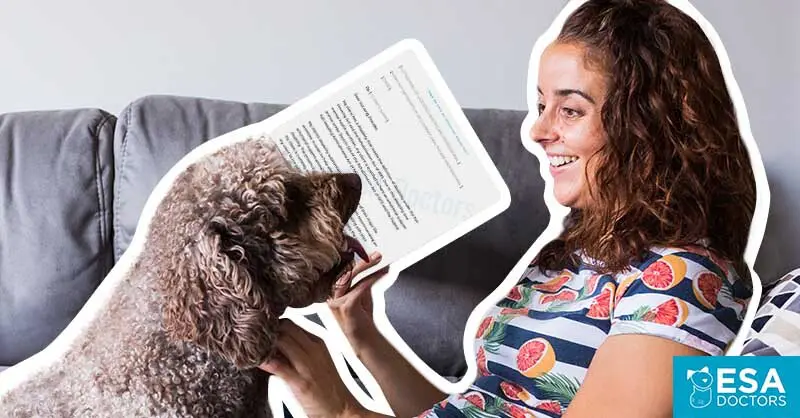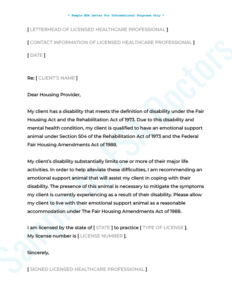An ESA letter for an emotional support animal should include all of the following:
- Information about the healthcare professional who wrote it
Their license number, state of practice, contact information, and signature (digital is acceptable). - Confirmation about your mental health
The letter should state you have a mental health condition that is helped by the presence of an emotional support animal — it does not have to specify your condition. - Validity date
The letter should also have the date the letter was issued. - Additional info if there’s more than one ESA
Mention of additional animals if you need more than one emotional support animal.
You’ll want to double-check that your ESA letter includes everything required. This can make the difference when it comes to living with your ESA in no-pet housing without paying pet fees or deposits. Landlords have the right to reject a tenant’s emotional support animal if the ESA letter is deficient.
Here is an example of an ESA letter with the required parts included in it:
What is a legitimate ESA letter?
HUD’s housing rules set out the requirements for the ESA letter. Under these rules, an ESA letter must be written by a licensed mental health professional and explain that you have a mental health condition that an animal helps with.
Before these rules came out, there was sometimes confusion about what a proper ESA letter should look like. HUD publishes these rules so there is predictability and certainty for tenants, landlords, and healthcare providers when it comes to expectations for what an ESA letter should look like.
With a legitimate ESA letter, you can live in rental housing where pets may not normally be allowed and avoid paying pet deposits and fees.
ESA Doctors, est. 2015
If you suffer from a mental health disorder and would like to qualify for an Emotional Support Animal online, ESA Doctors can help connect you to a health professional who is licensed in your state. Click below to get started.
Things you DON’T need in an ESA Letter
An ESA letter does NOT require any of these things:
- any type of certification or registration number, as there is no official registry or certification program for emotional support animals
- your specific diagnosis or medical history — this would raise privacy concerns
- notarization or statements under penalty of perjury from the healthcare provider
- an original “wet ink” signature – a digital signature is perfectly acceptable
An ESA letter does not necessarily need to identify a specific animal. That’s because you can get an ESA letter before adopting your emotional support animal, and the letter is documenting your need for an assistance animal in general, not certifying a particular pet.
An ESA letter also does not need to specify training requirements or behavioral certifications for the animal. That’s because ESAs are not required to have any special training (unlike psychiatric service dogs), and evaluating the training or behavior of an animal is outside the duties of a mental health professional anyway.
How can I get an ESA letter with everything I need?
Under HUD’s rules, only licensed healthcare professionals can write an ESA letter for you:
- licensed social workers
- licensed mental health counselors
- licensed marriage or family therapists
- psychologists
- psychiatrists
- psychiatric mental health nurses
- doctors
You can’t get an ESA letter from a provider like a dentist because, although they are licensed healthcare professionals, they don’t offer mental health evaluations. However, you can get one from your licensed therapist.
To get an ESA letter that’s properly written and has everything you need in it, try to find a healthcare professional who understands emotional support animals and has experience writing ESA letters. That will help ensure your landlord doesn’t find any holes in your ESA letter so they can give reasons to reject your ESA.
If you’re having trouble finding someone to write an ESA letter, ESA Doctors can help. We connect prospective ESA owners like you with licensed professionals who can assess your situation and provide an ESA letter that includes everything you need.







Leave a Comment